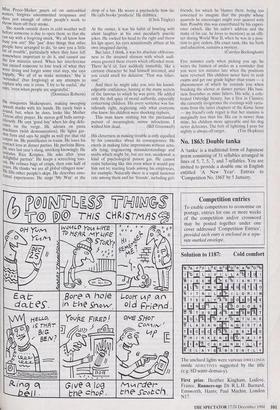ISLE OF
ISLE Of
i U R A ,A,UFMAIS(08,0L° 11
ShCLIMALII.COMI1ONO
COMPETITION
The monster
Jaspistos
IN COMPETITION NO. 1860 you were invited to provide a prose portrait of the most dislikable or irritating person you have known.
Here is the job done by a master hand. Whose? Ten pounds to the person whose correct answer to the author and the source is the first I read.
I do not think I ever appreciated the mean- ing of two words until I knew I—, the verb loaf, and the noun oaf; between them, they complete his portrait. He could
lounge, and wriggle, and rub himself against the wall, and grin, and be more in everybody's way than any other two people that I ever set my eyes. on. Nothing that he did became him; and yet you were con- scious that he was one of your own race, that his mind was cumbrously at work, revolving the problem of existence like a
quid of gum, and in his own cloudy manner enjoying life, and passing judgment on his fellows. Above all things, he was delighted with himself. You would not have thought it from his uneasy manners and troubled, struggling utterance; but he loved himself to the marrow, and was happy and proud like a peacock on a rail.E20 The prizewinners, printed below, get -
each, and the bonus bottle of Isle of JO
Single Malt Scotch whisky goes f°_
Dominica Roberts. A happy Christmas to you all.
Miss Peece-Maiker pours oil on untroubled Waters, forgives uncommitted trespasses and does just enough of other people's work to throw them off their stroke.
She stands outside doors in cold weather well before someone is due to open them, so that she can say with a forgiving smirk, 'We all know how busy you are!' She 'just' does things that other People have arranged to do, `to save you a little bit of trouble', particularly when they have left somewhere important to do it, and cannot use the few minutes saved. When her interference has caused someone to lose track of what they were doing and forget some vital step, she says happily, 'We all of us make mistakes.' She is wounded' (but forgiving) at any attempts to explain why one is cross. 'I try to be useful,' she says, 'even when people are ungrateful.'
(Dominica Roberts)
Be misquotes Shakespeare, making sweeping speech marks with his hands. He rarely buys a round, but, when he does, looks like Mother Teresa after prayer. He moves golf balls surrep- titiously. He says 'good boy' when his dog defe- cates on the verge. He advises on pasta Machines (with demonstration). He lights gar- den fires and says he might as well put that old carpet on. He pontificates in trains. He loses his He lens at dinner parties. He purloins Biros. xle uses last year's slang, smirking knowingly. He Imitates Rice Krispies. He asks after 'your delightful partner'. He keeps a screeching tom- cat. He refuses bags of crisps, then eats half of Yours. He thinks 'we are all global villagers now'. He fills other people's skips. He describes emo- `lanai experiences. He sings 'My Way' at the
drop of a hat. He wears a psychedelic bow tie. He calls books 'products'. He dribbles.
(Chris Tingley) At the outset, it was his habit of howling with silent laughter at his own peculiarly puerile jokes. He cocked his head to the right and threw his lips apart, his eyes sensationally ablaze at his own imagined daring.
But later, I think, it was his absolute oblivious- ness to the strained silences with which audi- ences greeted these events which offended most. There he'd sit, face suddenly immobile, like a cartoon character he had himself invented, and you could smell his delusion: 'That was hilari- ous!'
And then he might take you into his knowl- edgeable confidence, hinting at the many secrets of the famous to which he was privy. He added only the dull spice of moral authority, especially concerning children. His every sentence was fas- tidiously right, neglecting only what everyone else knew: his children were shocking cyphers.
This man knew nothing but the puritanical pursuit of meaningless, minor infractions. I wished him dead. (Bill Greenwell) His cleverness in making trouble is only equalled by his cowardice about its consequences. He excels in making false impressions without actu- ally lying, engineering misunderstandings and snubs which might be, but are not, accidental: a kind of psychological poison gas. He cannot resist behaving like this even when it would pay him not to; starting feuds among his employees, for example. Naturally there is a rapid turnover rate among them and his 'friends', including girl- friends, for which he blames them, being too conceited to imagine that the people whose quarrels he encourages might ever quarrel with him. Possibly this was exacerbated by his experi- ence (which, like his tailor's address and the make of his car, he loves to mention) as an offi- cer during World War II, when he was in a posi- tion to give orders. His exact rank, like his birth and education, remains a mystery.
(Carolyn Beckingham)
Five minutes early when picking you up, he wears the faintest of smiles as a reminder that you were ten minutes late when the positions were reversed. His children never have to resit exams and get one grade higher than yours — a phenomenon of which he reminds you when breaking the silence at dinner parties. His busi- ness flourishes as mine falters. His wife, a cele- brated Oxbridge beauty, has a first in Classics; she currently invigorates the evenings with varia- tions from the latter chapters of the Kama Sutra — my friend's only regret is that her stamina is marginally less than his. His car is newer than mine, his children more agreeable and his dog never defecates. The bolt of lightning I pray for nightly is always off target. (Tim Hopkins)











































































































 Previous page
Previous page